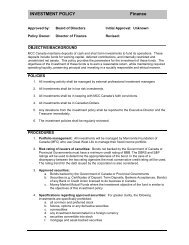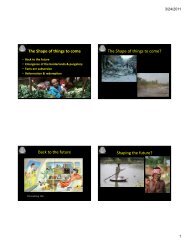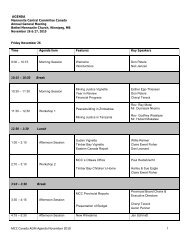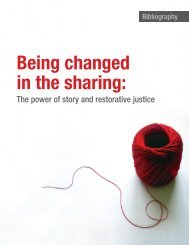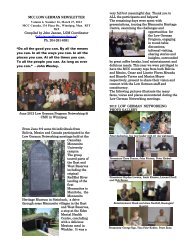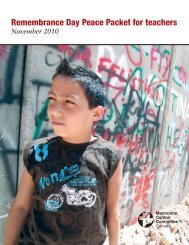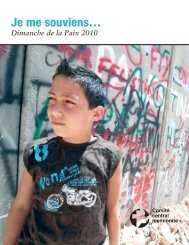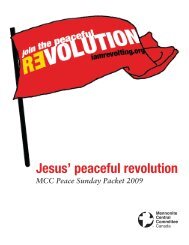Walking together: Healing and hope for Colombian refugees
Walking together: Healing and hope for Colombian refugees
Walking together: Healing and hope for Colombian refugees
Create successful ePaper yourself
Turn your PDF publications into a flip-book with our unique Google optimized e-Paper software.
w a l k i n g<br />
t o g e t h e r<br />
39<br />
Resources <strong>for</strong> developing Cross-Cultural Competency <strong>and</strong> Intercultural Communication skills:<br />
Foreign to Familiar: A Guide to Underst<strong>and</strong>ing Hot - <strong>and</strong> Cold - Climate Cultures, author Sarah A. Lanier, is an easy but<br />
enlightening read about cultural differences. While not specifically about Colombia, it applies well. Availably through YWAM or your local<br />
bookstore. (ISBN: 158158072X)<br />
Learning from the Stranger: Christian Faith <strong>and</strong> Cultural Diversity, author David I. Smith. According to the review on the<br />
Mennonite Church Canada website “Learning from the Stranger clearly explains what “culture” is, discusses how cultural difference<br />
affects our perceptions <strong>and</strong> behavior, <strong>and</strong> explores how Jesus’ call to love our neighbor involves learning from cultural strangers. Built<br />
around three chapter-length readings of extended biblical passages (from Genesis, Luke, <strong>and</strong> Acts), the book skillfully weaves <strong>together</strong><br />
theological <strong>and</strong> practical concerns, <strong>and</strong> Smith’s engaging, readable text is peppered with stories from his own extensive firsth<strong>and</strong><br />
experience.” Available through the Mennonite Church Canada resource centre. (ISBN: 9780802824639)<br />
http://www.mennonitechurch.ca/resourcecentre/ResourceView/2/12165<br />
The Canadian Centre <strong>for</strong> Intercultural Learning website has an excellent resource called “Country Insights”, whose Colombia<br />
page offers detailed answers to intercultural questions from both a <strong>Colombian</strong> <strong>and</strong> Canadian point of view. Although geared to the<br />
work place, the insights are useful <strong>for</strong> other contexts. There are also links to other websites <strong>for</strong> additional in<strong>for</strong>mation on history,<br />
politics <strong>and</strong> culture: http://www.intercultures.ca<br />
Beyond Intractability, a website devoted to “constructive approaches to destructive conflict”, offers a variety of articles on cross<br />
cultural communication tools. For example:<br />
Communication Tools <strong>for</strong> Underst<strong>and</strong>ing Cultural Differences:<br />
http://www.beyondintractability.org/essay/communication_tools/<br />
Cross-Cultural Communication:<br />
http://www.beyondintractability.org/essay/cross-cultural_communication/<br />
CULTURAL TIPS<br />
Colombia is a multi-cultural country. Its cultural diversity includes but is not limited to the Afro-<strong>Colombian</strong><br />
culture on the Pacific coast, the Caribbean culture on the Atlantic coast, a wide variety of Indigenous<br />
cultures throughout the country <strong>and</strong> the Andean culture in the mountain ranges running through the<br />
centre of the country. Added to the mix are people of Spanish, Western European, Lebanese <strong>and</strong> Jewish<br />
descent. The country is heavily regionalized, with each region having its own culture, industries, traditions,<br />
music, food, accent <strong>and</strong> even vocabulary. Unsurprisingly, most <strong>Colombian</strong>s feel a profound sense of<br />
regional identity. A notable result of this sense of regional identity is the presence of regional stereotypes,<br />
both positive <strong>and</strong> negative, held by most <strong>Colombian</strong>s toward their compatriots from other regions.<br />
The following is a list of general tendencies found across the range of <strong>Colombian</strong> cultures. These insights<br />
are given in the spirit of increasing awareness rather than encouraging adoption of <strong>Colombian</strong> customs.<br />
The refugee family will have to adapt to Canadian customs, however underst<strong>and</strong>ing some basic <strong>Colombian</strong><br />
customs may help interpret some of the things that your sponsored refugee family does or says at first,<br />
or may explain why the family acts surprised or even offended at some of the things you do.



